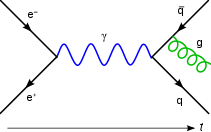Quantum cosmology
| Quantum field theory |
|---|
 |
| History |
Quantum cosmology[1][2] is the attempt in theoretical physics to develop a quantum theory of the universe. This approach attempts to answer open questions of classical physical cosmology, particularly those related to the first phases of the universe.
Classical cosmology is based on
Planck time where relativity theory fails to provide what must be demanded of a final theory of space and time. Therefore, a theory is needed that integrates relativity theory and quantum theory.[3] Such an approach is attempted for instance with loop quantum cosmology, loop quantum gravity, string theory and causal set theory.[4]
In quantum cosmology, the universe is treated as a wave function instead of classical spacetime.[5]
See also
- String cosmology
- Brane cosmology
- Loop quantum cosmology
- Top-down cosmology
- Non-standard cosmology
- Loop quantum gravity
- Canonical quantum gravity
- Dark energy
- Minisuperspace
- Hamilton–Jacobi–Einstein equation
- Theory of everything
References
- ISBN 978-1-4419-8276-6.
Notes
- S2CID 18463042.
- S2CID 16655619.
- ^ Stephen Hawking wrote 1999: So what the singularity theorems are really telling us, is that the universe had a quantum origin, and that we need a theory of quantum cosmology, if we are to predict the present state of the universe."Quantum Cosmology, M-theory and the Anthropic Principle - Stephen Hawking". Archived from the original on 2015-02-14. Retrieved 2015-02-14.
- .
- S2CID 118371273.
